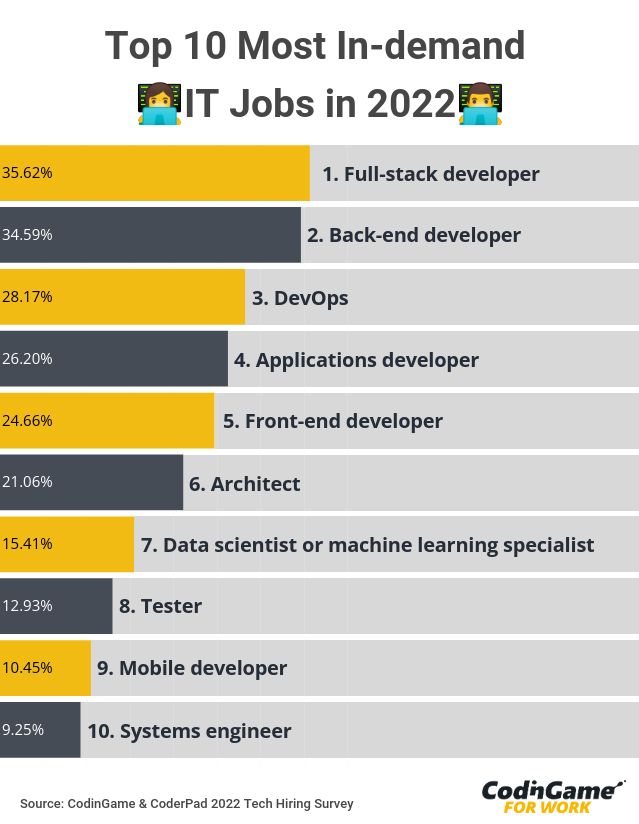Almost every aspect of our lives has become interwoven with technology, which means the exponential growth of demand for IT jobs will continue in this decade. Amidst the expansion of the world wide web, cloud computing, large data set, software, mobile applications, social media, and gaming, both big and small companies need to rely on qualified and highly-specialized IT experts.
As businesses scramble to keep up with the ongoing IT revolution, they are working hard to find and retain top talents. For many, accomplishing this goal means getting a head start in acquiring high-demand tech skills, which range from software development to data-oriented jobs, according to our 2022 CodinGame annual survey.
The top 10 most sought-after tech positions in 2020 (list based on our 2020 CodinGame annual survey):
- Full-stack developer
- Back-end developer
- DevOps
- Applications developer
- Front-end developer
- Architect
- Data scientist or Machine Learning specialist
- Tester
- Mobile developer
- Systems engineer
See infographic below!
What are these positions all about? Why are they essential to today’s tech ecosystem? Why are they in such high demand?
Read on to find out.
1. Full-stack developer
Full-stack web developers combine the work of front-end and back-end developers and are usually experts in all aspects of website development.
Full-stack engineers are at the very top of our list of in-demand IT jobs, with a huge 67.6% of our HR panel saying that they think they’ll struggle to hire full-stack developers in 2020.
Indeed, full-stack engineers are in high demand as many companies are currently shifting from siloed front-end and back-end development teams to programmers who are skilled in all layers of the application stack.
2. Back-end developer
Back-end developers make the front end of websites possible. The backend consists of the application, server and database. Back-end developers work with front-end developers to build and maintain the code behind websites’ user interface and design.
Most (if not all) companies need a fully functional website to serve their consumers. Back-end developers largely contribute to building and optimizing these websites.
3. DevOps
The demand for DevOps is increasing and with good reason. Going by Puppet’s 2019 State of DevOps report, businesses using DevOps practices are able to deploy code 30 times more frequently than their competitors with fewer deployment errors. This has a significant impact on downtimes and efficiency.
Therefore, many companies are hiring engineers with DevOps skills to manage scripting, coding, and process development. DevOps engineers usually handle IT infrastructure, supervise software testing and monitor performance after deployment.
A well-oiled DevOps team machine will supervise and coordinate projects, ensuring maximum efficiency in an organization’s processes.
4. Applications developer
An applications developer is a computer software engineer who creates, tests and programs apps for computers, mobile phones and tablets.
There is a huge need for mobile app developers, in particular. In 2021, there were 230 billion app downloads and mobile apps are projected to generate over 613 billion U.S. dollars in revenues in 2025. In particular, mobile games are among the biggest revenue-generating app category.
5. Front-end developer

A front-end developer works on the aspects of websites that users interact with – from dropdown menus and sliders to colors and fonts using a combination of CSS, HTML, and JavaScript.
Just as back-end developers are in demand to face the desperate need for functional websites, front-end developers are also sought after. Front-end developers strive to meet the growing expectations of today’s users who want their web experience to be faster, easier, and more exciting than ever before.
6. Architect
Solutions architects are in high demand and relatively short supply.
Architecture involves defining the components of a system, their functions, and their mode of interaction. Solution architecture is a complex process that bridges the gap between business and technology solutions.
Simply put, the architect identifies a business’ needs and finds solutions to problems through the design and development of apps and information systems.
One such system is cloud computing. Computer systems are shifting from actual physical storage to cloud services. A cloud architect handles server administration, networking, deploying and running of applications on virtual and physical platforms.
As interest in cloud architecture has grown, so has the demand for architect developers.
“These positions (architect engineers) are hard to fill because they require expertise with legacy systems and expertise with new cutting-edge technologies […] They are increasingly in demand but are not a combination of skills that you can necessarily pick up with the same ease you would with some of the new coding languages like Python.” – Emma Liebmann, head of talent acquisition at Collage.com, in an interview with TechRepublic
7. Data scientist or Machine Learning specialist
Businesses, general consumers and developers are gaining interest in Machine Learning and Artificial Intelligence (AI). In fact, in our recent CodinGame Developer Survey, 49.2% of respondents said they would like to learn more about these technologies in 2020.
This year, more companies will be searching for skilled professionals to handle the demands of AI-enabled products and services. There’s a high demand for candidates with knowledge of data science, Machine Learning, big data, natural language processing, AI integration and AI application programming.

As workloads increase, there is a recognized need to develop automation programs for time-consuming, menial, and sometimes redundant tasks. With AI, employees can focus on more productive tasks.
Machine Learning specialists are advanced programmers who create AI machines and systems that can learn and apply knowledge. They use sophisticated programming and work with complex data sets and algorithms to teach machines.
Companies need data experts to store, sort, and analyze data retrieved by the organization. Such data is usually highly sensitive, which makes it especially important to have skilled workers who can process valuable data without jeopardizing the company.
8. Tester
A “tester” tests software or related projects for errors, bugs, defects or any issues that the end-user might encounter. Simply put, the job of the tester is to evaluate products and create reports for the project team regarding any issues or necessary improvements. To accomplish this, they analyze the project and ascertain the types of tests required. They then create a plan to implement the tests.
As technology continues to gain speed, so does the need for testers. However, working as a tester requires specific and relatively rare skills – it’s not for everyone! Even the most talented programmers can’t (necessarily) substitute the specialized skills of a tester.
Indeed, it’s not easy to create the specific testing frameworks for a software, cause its failure, and then analyze its ability to recover fully. Testers need to brainstorm to test the logic behind every line of code that makes software work. A product will not be approved for use or sale unless it scales through all the tests performed.
9. Mobile developer
According to research published by TechJury:
Smartphone users worldwide are estimated to reach 3.8 billion in 2021.
There were 204 billion apps downloads in 2019 worldwide.
Mobile apps are projected to generate 188.9 billion US dollars in revenues in 2020.
As the number of mobile users increases, so does the revenue potential for businesses. Today, companies who want to maintain relevance do not only need websites but also mobile apps.
The mobile developer is a programmer that designs and codes applications and programs that run on smartphones and tablets. They allow companies to deploy every feature from their regular computer website to the mobile platform.
Mobile developers are in high demand this year, as companies look to create and update their space on mobile. What’s more, employment for app developers is projected to grow 31% by 2026, according to the US Bureau of Labor Statistics.
10. Systems engineer
Systems Engineers manage and monitor all installed systems and infrastructure. This may involve installing, configuring, testing, and maintaining the operating system, application software, and system management tools.
Although systems engineering is not new, today the demand for it is increasing in many industries. Systems engineering began in the United States in the 1950s to address the multidisciplinary aspects of space, weapons, and communication systems. Recently, demand has spread to other industries, such as automobiles, medical devices, and manufacturing. This is a boon for systems engineers as more and more companies add work-focused roles.
In conclusion
Technology will continue to experience rapid change, but it is here to stay. As companies in different sectors – finance, healthcare, automotive, and so on – continue to adopt different technologies to increase output and revenue and streamline workflow, the rise in demand for skilled tech workers is inevitable – and the positions listed above are first in the tech recruiter’s firing line!


